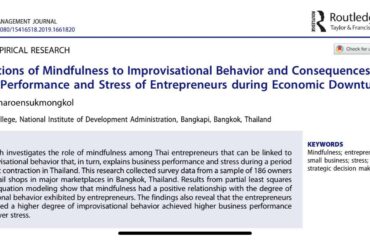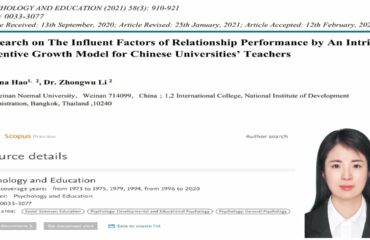The recent research published by the faculty of ICO NIDA, Assoc. Prof. Dr. Peerayuth Charoensukmongkol, indicates that one crucial characteristic of entrepreneurs that could contribute to the survival of SMEs during the economic crisis caused by the COVID-19 pandemic is “Improvisational behavior”.
Improvisational behavior is a spontaneous action guided by intuition, produced or carried out in the spur of the moment instead of going through intentional thought and evaluation processes. Basically, individuals who possess improvisational behavior can be described by three main characteristics. First, they have the ability to perform tasks effectively under time pressure. Second, they tend to be innovative in how to combine and use resources at hand toward new problems and opportunities. Third, they generally have perseverance and do not give up easily when experiencing setbacks and failure.
Improvisational behavior is particularly imperative during the crisis when entrepreneurs have little time, expertise, or inclination for contingency planning. Because the unpredictable economic impacts resulting from the COVID-19 pandemic disrupted virtually every aspect of business activities, entrepreneurs who rigidly depend on preplanned routines and decision-making could suffer from the inability to respond quickly to the disruption brought on by the crisis. With improvisational behavior, entrepreneurs can make decisions on the spot to solve unexpected problems, thereby enhancing the proactiveness of their business to deal with contingencies caused by the pandemic. It also gives them more flexibility to make adjustments and be more responsive to a changing and uncertain business environment during the economic crisis.
The results from his research, which collected data from the sample of 312 SMEs during the second wave of COVID-19 pandemic in Thailand, supports the positive relationship between the improvisational behavior of entrepreneurs and firm performance. Moreover, the positive impact of improvisational behavior on firm performance tends to be stronger for firms that encountered a higher level of competitive intensity and for firms that possessed a higher level of financial and human resources.
His research provides important recommendations regarding the competency development of entrepreneurs that are required to enable them to manage their business successfully during the economic crisis. Considering the disruptive nature and the unpredictability of the COVID-19 pandemic which constrained the ability of entrepreneurs to rely on formalized strategic decision-making or long-term strategic planning to deal with the volatility of the business environment, improvisation is recommended as the competency that entrepreneurs need to develop to enhance their capability to deal with contingencies that arise during the crisis.
Source:
Charoensukmongkol, P. (2021), Does Entrepreneurs’ Improvisational Behavior Improve Firm Performance in Time of Crisis?, Management Research Review. https://doi.org/10.1108/MRR-12-2020-0738





